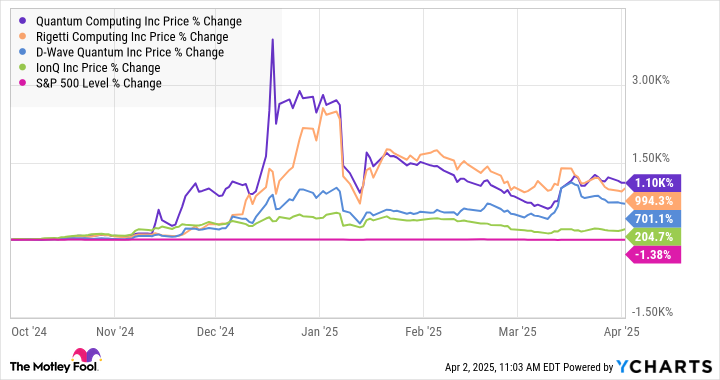In March, the quantum computing sector experienced significant fluctuations in stock prices. Data from S&P Global Market Intelligence revealed that D-Wave Quantum (NYSE: QBTS) surged by 38.7%, while Quantum Computing (NASDAQ: QUBT) increased by 31.9%. Conversely, Rigetti Computing (NASDAQ: RGTI) saw a decline of 6.4%, and IonQ (NYSE: IONQ) dropped by 10.2%.
It was a notably eventful month:
-
Three companies from this sector released their earnings reports in March.
-
A major industry conference occurred that had the potential to influence the market.
-
D-Wave touted a significant breakthrough in its technological research.
D-Wave’s major gain began on March 12 when it announced that its annealing quantum computing systems had successfully tackled a “useful, real-world problem.” The company promoted this development as a “landmark” achievement that “unequivocally validates” a significant milestone in the industry.
The following day, D-Wave released its earnings report, showing steady sales year-over-year, and a reduction in net losses, which fell from $0.60 to $0.15 per share under Generally Accepted Accounting Principles (GAAP). Investors responded positively to the company’s promising technology and financial results, causing the stock to rise 92% in just three days, lifting the rest of the sector along with it.
In contrast, Rigetti and Quantum Computing reported disappointing results that were far beneath analyst expectations. Rigetti’s fourth-quarter sales decreased by 33% year-over-year, resulting in a net loss increase from $0.09 to $0.68 per share. Meanwhile, Quantum Computing saw a 17% decline in sales and a 35% rise in operating costs, with net losses rising from $0.09 to $0.47 per share in the last quarter. Despite these revelations, Quantum Computing’s share price did not react significantly.
Nvidia overshadowed Quantum Computing’s earnings report by organizing a “quantum day” event at the GTC technology conference around the same time. During the event, CEO Jensen Huang publicly retracted his prior predictions about the quantum computing industry’s real-world applications being two decades away. However, investors appeared skeptical of his apology, resulting in heightened volatility in quantum stocks on March 20.
While D-Wave’s moment of “quantum supremacy” had a temporary uplifting effect on the sector, its legitimacy quickly came into question. Scientific American even reported that researchers had effectively disproved D-Wave’s findings during the peer-review process. Although the gains experienced by pure-play quantum computing stocks have been substantial—tripling over the past six months—they may be unsustainable as the excitement around this sector begins to cool.
In summary, the quantum computing market appears to have been overhyped following Alphabet’s announcement regarding its Willow technology. As speculation fades, it is likely that the stocks in this sphere will trend downwards. Long-term potential exists for quantum computing to revolutionize numerous industries, but it’s premature to identify clear winners in this race. Investors should manage their exposures cautiously. Alternatively, it may be wise to invest in established tech leaders like Alphabet and Nvidia, who are invested in quantum research while maintaining robust business fundamentals.



